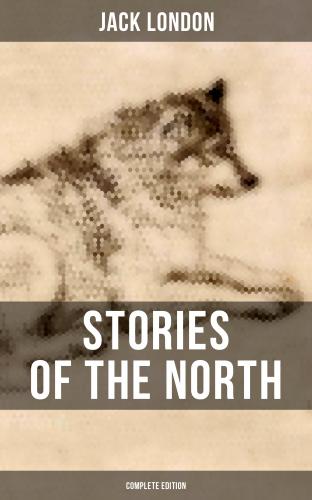‘The time was met. I felt the call of her breast, and it seemed there I must pillow my head and forget. She opened her arms to me, and I came against her. Then, sudden, the hate flamed in her eye, her hand was at my hip. And once, twice, she passed the knife.
‘“Dog!” she sneered, as she flung me into the snow. “Swine!” And then she laughed till the silence cracked, and went back to her dead.
‘As I say, once she passed the knife, and twice; but she was weak with hunger, and it was not meant that I should die. Yet was I minded to stay in that place, and to close my eyes in the last long sleep with those whose lives had crossed with mine and led my feet on unknown trails. But there lay a debt upon me which would not let me rest.
‘And the way was long, the cold bitter, and there was little grub. The Pellys had found no moose, and had robbed my cache. And so had the three white men, but they lay thin and dead in their cabins as I passed. After that I do not remember, till I came here, and found food and fire—much fire.’ As he finished, he crouched closely, even jealously, over the stove. For a long while the slush-lamp shadows played tragedies upon the wall.
‘But Unga!’ cried Prince, the vision still strong upon him.
‘Unga? She would not eat of the ptarmigan. She lay with her arms about his neck, her face deep in his yellow hair. I drew the fire close, that she might not feel the frost, but she crept to the other side. And I built a fire there; yet it was little good, for she would not eat. And in this manner they still lie up there in the snow.’
‘And you?’ asked Malemute Kid.
‘I do not know; but Akatan is small, and I have little wish to go back and live on the edge of the world. Yet is there small use in life. I can go to Constantine, and he will put irons upon me, and one day they will tie a piece of rope, so, and I will sleep good. Yet—no; I do not know.’ ‘But, Kid,’ protested Prince, ‘this is murder!’ ‘Hush!’ commanded Malemute Kid. ‘There be things greater than our wisdom, beyond our justice. The right and the wrong of this we cannot say, and it is not for us to judge.’ Naass drew yet closer to the fire. There was a great silence, and in each man’s eyes many pictures came and went.
The God of His Fathers: Tales of the Klondike (1901)
The God of His Fathers
I
On every hand stretched the forest primeval,—the home of noisy comedy and silent tragedy. Here the struggle for survival continued to wage with all its ancient brutality. Briton and Russian were still to overlap in the Land of the Rainbow’s End—and this was the very heart of it—nor had Yankee gold yet purchased its vast domain. The wolf-pack still clung to the flank of the cariboo-herd, singling out the weak and the big with calf, and pulling them down as remorselessly as were it a thousand, thousand generations into the past. The sparse aborigines still acknowledged the rule of their chiefs and medicine men, drove out bad spirits, burned their witches, fought their neighbors, and ate their enemies with a relish which spoke well of their bellies. But it was at the moment when the stone age was drawing to a close. Already, over unknown trails and chartless wildernesses, were the harbingers of the steel arriving,—fair-faced, blue-eyed, indomitable men, incarnations of the unrest of their race. By accident or design, single-handed and in twos and threes, they came from no one knew whither, and fought, or died, or passed on, no one knew whence. The priests raged against them, the chiefs called forth their fighting men, and stone clashed with steel; but to little purpose. Like water seeping from some mighty reservoir, they trickled through the dark forests and mountain passes, threading the highways in bark canoes, or with their moccasined feet breaking trail for the wolf-dogs. They came of a great breed, and their mothers were many; but the fur-clad denizens of the Northland had this yet to learn. So many an unsung wanderer fought his last and died under the cold fire of the aurora, as did his brothers in burning sands and reeking jungles, and as they shall continue to do till in the fulness
